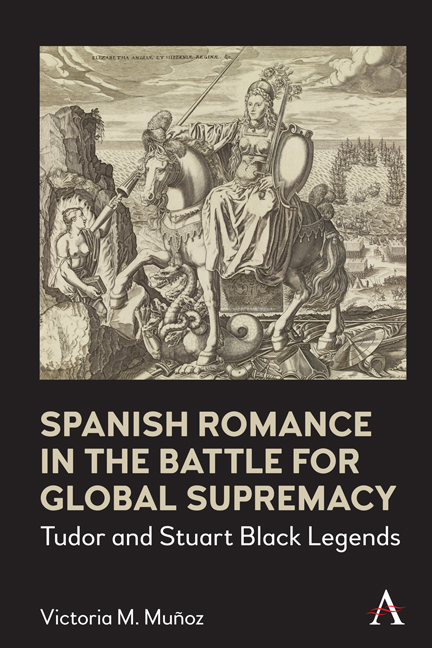Book contents
- Frontmatter
- Contents
- List of Figures
- Acknowledgments
- Prologue: Translating Romance, Empire, and Spain
- Chapter One “Books of the Brave” English: Spanish Tales of Love and Arms in Translation
- Chapter Two Dream Visions and Competing Dreams: Rewriting the Spanish Model in America
- Chapter Three Sun Kings and Moon Queens: The Courting and Uncourting of Spain
- Chapter Four Signs of England: Redcrosse Crosses the Ancient Boundary
- Chapter Five Believing Bottom’s Dream: Rationalizing Exploration from America to Australia
- Chapter Six Unruly Readers: Anti-Spanish Sentiment and the Feminizing of Romance
- Epilogue: Spanish Literature in England before Don Quixote
- Appendix I English Readership of Spanish Romance, By the Numbers
- Selected Bibliography
- Index
Epilogue: Spanish Literature in England before Don Quixote
Published online by Cambridge University Press: 22 February 2022
- Frontmatter
- Contents
- List of Figures
- Acknowledgments
- Prologue: Translating Romance, Empire, and Spain
- Chapter One “Books of the Brave” English: Spanish Tales of Love and Arms in Translation
- Chapter Two Dream Visions and Competing Dreams: Rewriting the Spanish Model in America
- Chapter Three Sun Kings and Moon Queens: The Courting and Uncourting of Spain
- Chapter Four Signs of England: Redcrosse Crosses the Ancient Boundary
- Chapter Five Believing Bottom’s Dream: Rationalizing Exploration from America to Australia
- Chapter Six Unruly Readers: Anti-Spanish Sentiment and the Feminizing of Romance
- Epilogue: Spanish Literature in England before Don Quixote
- Appendix I English Readership of Spanish Romance, By the Numbers
- Selected Bibliography
- Index
Summary
A rocket launches into space by expelling energy from engines that provide initial uplift. Once exit velocity is supplied by the preliminary engines, those instruments are expelled to allow for greater transit force in the second stage of a rocket's journey. If Don Quixote was a rocket to the English novel, and from there to the deep space of an English empire, then tales of love and arms were the rocket fuel and engines used to establish initial momentum and later jettisoned in order to make way for a second phase of literary, national and imperial propulsion. As witnessed by the trans-historiography of English literature, the early jettisoning of Spanish romance therefore corresponds with England's ideological repudiation of Spain as an initial propulsive phase in the formation of the British Empire.
An Early Modern Space Race
Look at the British Colonial empire—the most magnificent empire that the world ever saw. The old Spanish boast that the sun never set in their dominions, has been more truly realised amongst ourselves.
—Sir Henry Ward, speech before the House of Commons, 1839“Contact light.”
Buzz Aldrin, first words spoken by man on lunar surface, 20 July, 1969
“—magnificent desolation…”Buzz Aldrin, second words spoken by man setting foot on lunar surface, 20 July, 1969.
The early modern contest for global exploration and conquest strikes so eloquently with essentialist notions of European and Western supremacy that one need to look no further than to the cross-pollinating treatises over the possibility of lunar colonization to find proof of their prolificity. Space constricts me—I cannot rehearse the twentiethcentury Americo-Russian competition for Cold War space travel, easily comparable to those famous Anglo-Spanish naval skirmishes and colonial contests of the sixteenth century that led to not only major innovations in maritime navigation, but also the most fertile dreams of literal and metaphorical spaceflight. Suffice it to say that this Renaissance verve began much earlier with the classical writers and philosophers who speculated about what might lie beyond the world's end at Thule and it culminated with the European conquest of America, justified as a holy war to bring the true light of Christianity to the so-regarded dark places of the world, cast in metaphorical night.
- Type
- Chapter
- Information
- Spanish Romance in the Battle for Global SupremacyTudor and Stuart Black Legends, pp. 191 - 202Publisher: Anthem PressPrint publication year: 2021



